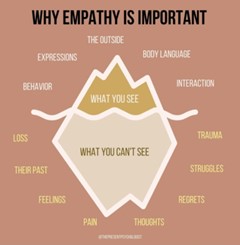Do you employ empathy as a leader? I’ll admit, I can improve as an empathetic leader. Empathy is one quality I’m working to employ in my regular rhythms of life and leadership. Recently, I talked with a colleague who shared a personal struggle with me. I was grateful he trusted me, but the conversation made me realize I had no idea what was going on in his world. Often, we don’t know what’s going on—the struggles, challenges, hurts, and pains—beneath the surface of our friends, colleagues, or strangers we meet. If we did, we’d all practice a bit more empathy.
Each year, Resurrection partners with the Global Leadership Network as a host site for the Global Leadership Summit. The GLS is a dynamic, two-day event gathering leaders across the globe to learn, share ideas and stories, and to hear from a diverse slate of leading experts from a variety of fields and backgrounds. Each year, I walk away having learned something. I’m sharing some take aways and key learnings here in my posts.
Today, I’m returning to Johnny C. Taylor’s talk about empathy. He’s an HR expert with insights into empathy and the workplace.
Interestingly, according to one study, 73% of US Americans believe empathy is important to our society.[1] However, we are more polarized as a society than we’ve been in living memory. While partisan politics has been part of the American political system, partisan hostility is growing. According to a Pew Research study, “Republicans and Democrats view not just the opposing party but also the people in that party in a negative light. Growing shares in each party now describe those in the other party as more closed-minded, dishonest, immoral and unintelligent than other Americans.”[2]
What are we to make of increasing polarization? Taylor identifies the problem—we have an empathy deficit. We’ve set up permanent rivalries—me versus you, us versus them. We’re more diverse than ever before, and still, more divided. It’s easy to lack empathy. Really, to lack empathy requires little thought. But, what if we considered our collective responsibility to each other?
Taylor invites us to consider the collective responsibility we share as humans. He proposes that empathy is inherent to our being—it’s a muscle we already have but need to strengthen. In suggesting we can cultivate empathy around us, he proposes three steps:
Step 1—Discuss, don’t debate. Taylor proposes that our goal should be to learn about each other, from each other, rather than to assert our own ideas. Instead of trying to win, listen!
Step 2—Embrace Diversity. We are humans—messy, complex, complicated, and beautiful. Diversity is a gift to embrace. Diversity makes us better. Diversity also invites us to meet people where they are and seek to understand them.
Step 3—Be Kinder. Taylor proposes we ought to remove the “random” from random acts of kindness. Simply, be kind! Kindness is contagious.
Here’s a great image of empathy. Dr. Nora Gold writes, “Some people think of empathy as a ’soft’ skill, but really it is the core of emotional intelligence, so it's absolutely essential to positive relationships in the workplace (and everywhere).” She provides an illustration to better understand the difference between what we see and what we cannot see.

Empathy enables us to wade through complexity, competing ideas, conflict and challenges to see others around us. They are human, too! Practicing empathy will transform your home, team, or organization. How much empathy is there where you live, work, and play? How will you increase it?

Joshua Clough served as Location Pastor for Resurrection Overland Park. He completed his doctorate in Practical Theology and Leadership at Fuller Theological Seminary. He runs marathons, ultra-marathons, and because he grew up in Seattle, drinks a lot of coffee.
[1] Source: https://www.prnewswire.com/news-releases/report-is-empathy-dead-in-america-301409622.html#:~:text=Although%20nearly%2025%25%20of%20Americans,are%20concerned%20about%20the%20decline.
[2] Source: https://www.pewresearch.org/politics/2022/08/09/as-partisan-hostility-grows-signs-of-frustration-with-the-two-party-system/
Sign in to continue to your account
Become a ShareChurch member for access to free resources.
You are free to browse the ShareChurch site without an account. However, you must have an account in order to download content from the site.